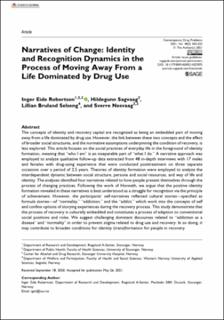| dc.contributor.author | Robertson, Inger Eide | |
| dc.contributor.author | Sagvaag, Hildegunn | |
| dc.contributor.author | Selseng, Lillian Bruland | |
| dc.contributor.author | Nesvåg, Sverre Martin | |
| dc.date.accessioned | 2021-09-06T08:31:07Z | |
| dc.date.available | 2021-09-06T08:31:07Z | |
| dc.date.created | 2021-08-16T09:52:18Z | |
| dc.date.issued | 2021 | |
| dc.identifier.citation | Robertson, I. E., Sagvaag, H., Selseng, L. B., & Nesvaag, S. (2021). Narratives of change: Identity and recognition dynamics in the process of moving away from a life dominated by drug use. Contemporary Drug Problems, 48(3), 204–222. | en_US |
| dc.identifier.issn | 0091-4509 | |
| dc.identifier.uri | https://hdl.handle.net/11250/2773660 | |
| dc.description.abstract | The concepts of identity and recovery capital are recognized as being an embedded part of moving away from a life dominated by drug use. However, the link between these two concepts and the effect of broader social structures, and the normative assumptions underpinning the condition of recovery, is less explored. This article focuses on the social practices of everyday life in the foreground of identity formation, meaning that “who I am” is an inseparable part of “what I do.” A narrative approach was employed to analyze qualitative follow-up data extracted from 48 in-depth interviews with 17 males and females with drug-using experience that were conducted posttreatment on three separate occasions over a period of 2.5 years. Theories of identity formation were employed to analyze the interdependent dynamic between social structure, persona and social resources, and way of life and identity. The analyses identified four narratives related to how people present themselves through the process of changing practices. Following the work of Honneth, we argue that the positive identity formation revealed in these narratives is best understood as a struggle for recognition via the principle of achievement. However, the participants’ self-narratives reflected cultural stories—specified as formula stories—of “normality,” “addiction,” and the “addict,” which work into the concepts of self and confine options of storying experiences during the recovery process. This study demonstrate that the process of recovery is culturally embedded and constitutes a process of adaption to conventional social positions and roles. We suggest challenging dominant discourses related to “addiction as a disease” and “normality” in order to prevent stigma related to drug use and recovery. In so doing, it may contribute to broaden conditions for identity (trans)formation for people in recovery. | en_US |
| dc.language.iso | eng | en_US |
| dc.publisher | Sage | en_US |
| dc.rights | Navngivelse 4.0 Internasjonal | * |
| dc.rights.uri | http://creativecommons.org/licenses/by/4.0/deed.no | * |
| dc.subject | addiction | en_US |
| dc.subject | recovery | en_US |
| dc.subject | Honneth | en_US |
| dc.subject | recognition and identity | en_US |
| dc.subject | narrative | en_US |
| dc.subject | social practice | en_US |
| dc.title | Narratives of Change: Identity and Recognition Dynamics in the Process of Moving Away From a Life Dominated by Drug Use | en_US |
| dc.type | Peer reviewed | en_US |
| dc.type | Journal article | en_US |
| dc.description.version | publishedVersion | en_US |
| dc.rights.holder | © The Author(s) 2021 | en_US |
| dc.source.pagenumber | 204-222 | en_US |
| dc.source.volume | 48 | en_US |
| dc.source.journal | Contemporary Drug Problems | en_US |
| dc.source.issue | 3 | en_US |
| dc.identifier.doi | 10.1177/00914509211027075 | |
| dc.identifier.cristin | 1926183 | |
| cristin.ispublished | true | |
| cristin.fulltext | original | |
| cristin.qualitycode | 1 | |

